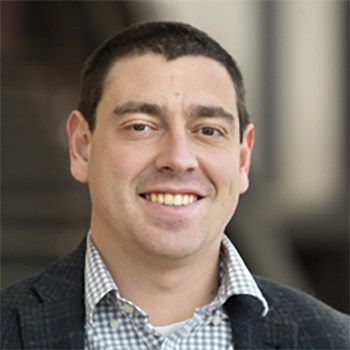
Alex Gorodetsky Wins NSF CAREER Award
Aerospace Assistant Professor receives prestigious award to support early-career faculty

Aerospace Assistant Professor receives prestigious award to support early-career faculty
Michigan Aerospace Assistant Professor, Alex Gorodetsky, recently received the National Science Foundation (NSF) Faculty Early Career Development (CAREER) Award for his research, “New Foundations for Multi-Fidelity Prediction, Estimation, and Learning Under Uncertainty in Dynamical Systems.” The CAREER award is the most prestigious award presented by the NSF to support early-career faculty members beginning their independent careers and their research. Those awarded serve as academic role models in research and as educators demonstrating their potential to lead advances in the mission of their department or organization.
Using the CAREER grant, this research will enable autonomous systems to fuse higher fidelity models and data to estimate the effects of prediction uncertainty on planning and control decisions. The project will apply new techniques to problems involving autonomous flight of soaring aircraft and estimation in chaotic nonlinear flows. Accordingly, this will offer new approaches for travel, reconnaissance, and observation in hard to reach areas of the atmosphere.

“Next generation autonomous aerospace vehicles have the potential to tremendously expand our transportation, reconnaissance, and observation capabilities — including in hard-to-reach areas of the atmosphere,” Assistant Professor Gorodetsky comments. “Being autonomous, these vehicles often rely on built-in simulators to assess future effects of their decisions. However, these simulators often make static and simplistic assumptions about their environment or are overly conservative by assuming worst-case behavior. For example, they may assume unchanging winds, atmospheric boundary layers, or static updrafts to optimally extract energy from prevailing winds. Such assumptions can significantly affect the ability of these vehicles to operate effectively— for example to predict optimal energy-efficient paths through complex environments — if they are not reflective of reality. Moreover, without assessing the uncertainty in their predictions, such simulators may result in suboptimal or catastrophic decisions, as opportunities for optimal performance are missed or safety constraints are violated.”
Gorodetsky further explains: “This project addresses this challenge by developing new, fast, and automated algorithms for rigorously quantifying uncertainty and rapidly fusing higher-fidelity environmental models with data; and by validating these algorithms using experimental aircraft in controlled but complex wind conditions.”
The CAREER grant spans a period of five years, during which Gorodetsky intends to combine his research with educational initiatives focused on bringing a computational perspective on modeling, data science, and statistics to engineering students and the public. This will be accomplished through a series of workshops centered around relevant case studies, a new data science class for an aerospace engineering curriculum, and a collaboration with the Ann Arbor Hands-On Museum to design exhibits accessible to K-8 students and their parents.
Gorodetsky elaborates on his goals for the Ann Arbor Hands-On Museum, “I am interested in providing an avenue in which the broader community can learn about computation, data science, and how it impacts their lives. To foster greater diffusion of knowledge to the community, I sought to partner with the Ann Arbor Hands-On Museum to design and develop new exhibits and workshops to showcase how machine learning, data science, and computation impact our lives and communities, and part of this grant goes toward supporting these developments.”